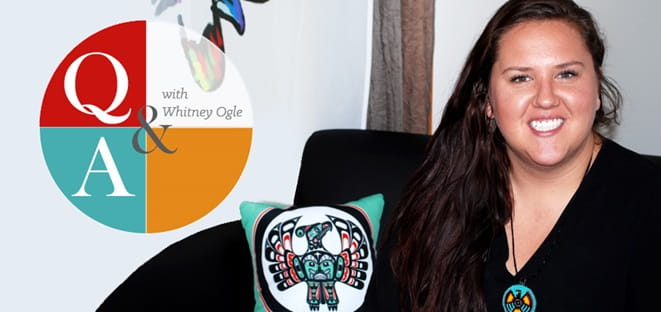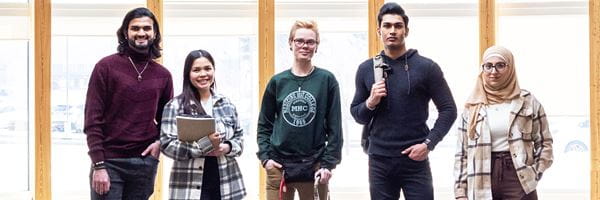Meet Whitney Ogle: Social work grad and collective, compassionate dreamer who leads with an open heart

Q: Share some stories from your childhood. What experiences made you who you are today?
I grew up on a farm outside of my reserve in Wood Mountain, Saskatchewan. My childhood was spent outside – playing with my fur animals, building forts, catching frogs, and swimming in the dugout. I was a wild little child. It was very carefree. It was also a collective of my Indigenous identity and my English identity. It was trying to walk a path between two worlds, one world being circular and the other a linear way of life. It meant being cheerleading captain of my high school team, but also doing ceremony on my reserve. There was very much that difference between the worlds that I lived.
Q: How did you come to be a Medicine Hat College student?
High school was definitely a challenge for me. After graduation, I had 12 different jobs in my first year out of school. My mom sat me down one day and explained to me what a career was and talked about the difference of just having jobs and having a career. Then she registered me for the office technology program at Medicine Hat College - against my will.
Q: Despite being a college student against your will, how did that experience shape your future?
I started the office technology program in 2006 and did ok, but realized I was a horrible administrative professional. Absolutely horrible. During my practicums I was constantly asked by my employers ‘what can we do to support you in doing better at your job?' They were very supportive. At the same time, I was walking a path to become deeper connected to my identity as an Indigenous person. While working at Children's Services as an administrative assistant, I really connected with our Indigenous families. It was there that one of the caseworkers said I needed to be in social work. So in 2011, I came back to Medicine Hat College for my social work diploma.
Q: What changed for you as a social work student?
The diploma was absolutely amazing. For the first time in my life I was 4.0 and on the honour roll. I found my niche. I found my passion. To go from failing in high school to a 4.0 was a huge, huge achievement for me. No one was asking me if I needed support to do better. During my diploma, I did a practicum at the Miywasin Friendship Center and that's really when my embracing of identity really came alive and my passion for educating and education started.
Q: What came next?
I loved the diploma and I loved social work so much that I applied for the Learning Circles program [offered at MHC in partnership with the University of Calgary] and did my degree here. It was in my degree that I really had a shift of my paradigm. I understood I had a purpose. That purpose was reconciliation for our nations and that it was going to be achieved through education.
Q: What does post-secondary education mean to you?
I'm actually the first person in my family to graduate post-secondary. So what that's done on a collective approach, a family approach and a systems approach is bigger than just me. It's an achievement for my family and my community. Post-secondary education, what I have been taught, is now known as the new buffalo. Post-secondary education will provide all of us as the human nation with the tools that we need to walk a good path. It has truly changed my life. Through the creation of spaces for Indigenous ways of knowing I hope to support or help change other people's lives. To help them achieve self-sustainment and reach their highest potential. I can't express enough how important post-secondary education is.
Q: During your time as the Indigenous Support Specialist at MHC, what kind of growth did you experience personally or witness on campus?
It was one of the most transformational times of my life, hands down. I grew immensely in my self-awareness, my passion and my understanding of systems. I walked with my head held higher, in the most humble way. This position represented huge growth for MHC. It's about accepting identity. It’s about creating opportunities for a nation.
Some people jumped on board and committed to reconciliation, doing so much self-awareness work when it comes to our belief systems and shared history. But then there is still a fear. It's a lot to ask someone to look at their belief system and to view our shared history a different way. There is sometimes resistance that comes from asking but that's OK. If we sit in that uncomfortable space for a bit the opportunity for growth becomes even greater.
Q: How do you respond to that fear or resistance?
With an open heart. I try to understand that resistance and its context by respecting other belief systems, paradigms and worldviews, and creating a safe and gentle place to explore those views. Growing up in two worlds, there were beliefs within my own family where the underlining was racism or oppression that I then viewed on other people. I realized I had to look at my own beliefs and thoughts and not shame myself so I could work through them. It’s about acceptance and non-judgement. It is what it is so we should talk about it. Once we put language to our thoughts, we own them.
Q: Who or what has been your greatest influence or inspiration professionally and/or personally?
The commitment and passion of educators. Understanding how much they give of themselves to support their learners is was inspiring for me because I received that all through my education here at MHC. My father is probably the biggest inspiration when it comes to my identity and walking my own path of healing and reconciliation. Future generations are also an inspiration for me as we pass our knowledge to our youth.
Whitney's path now leads her to the University of Calgary where she will support students as the Indigenous Advisor in SU Wellness Centre and pursue a master of education degree.
Learn more about MHC's Indigenous support services.
interested in a career in

